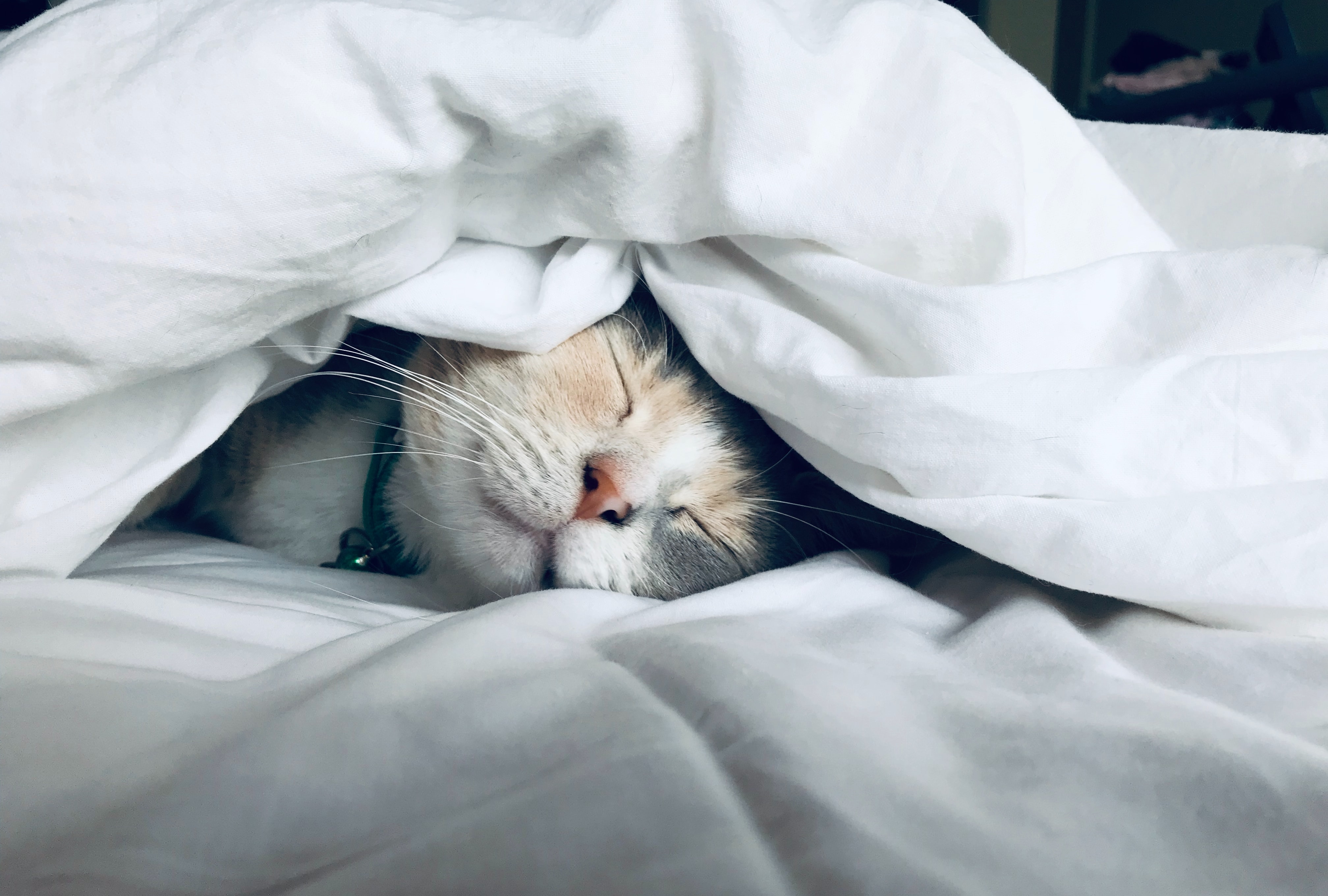The Difference Between Meditation and Sleep
27th Feb 2020

If you’re new to meditation, chances are you’ve already seen some noticeable improvements in your mood and energy. You may be feeling lighter and more at peace with the world, happier during the day, and less stressed in general.
Despite all the blissful and energy-enhancing effects meditation can have, there is a definite difference between meditation and sleep. One of the keys to building a successful meditation practice is getting enough rest in between sessions.
Although sleep and meditation share some common characteristics, they have slightly different effects on the body and mind.
We’ll compare the two in detail to help you understand the difference between them and how to get the best out of both worlds.
How Are Meditation and Sleep Similar?
A good night’s rest and a great meditation session have one specific thing in common - they both involve an altered state of consciousness.
Don’t worry, we’re not getting all woo-woo on you now - the fact is, your own mind takes a break every single night, so we’re all experiencing altered states of consciousness on a regular basis!
To really understand the core differences between meditating and sleeping, we need to examine the details of what each one actually is, and the effects they have on the body and brain.
The Mechanics of Sleep
Have you ever thought about what sleep actually is? If you look up the word “sleep” in the Oxford Dictionary, you’ll find this definition:
“A condition of body and mind which typically recurs for several hours every night, in which the nervous system is inactive, the eyes closed, the postural muscles relaxed, and consciousness practically suspended.”
That sounds pretty much like what happens to each of us every night, doesn’t it?
You’ll notice that certain parts or systems are mentioned specifically - the nervous system, the eyes, the postural muscles, and consciousness.
This indicates that both the body and the brain are involved in this sleeping thing. But what exactly happens to them while we’re asleep?

What Happens in the Body During Sleep?
We all understand that the body rests and rejuvenates while we’re sleeping.
There are some specific processes that occur while we’re snoring away that help our bodies to heal and gain back the energy we expend during the day.
-
Cellular Repair & Regeneration
While we’re asleep, there’s an increase in blood flow to muscles. This helps to repair all the damage we’ve done during the day - and yes, everyday activities do cause damage!
There’s also a fairly sizable release of growth hormone during sleep, which helps cells to repair, regenerate, and in some cases, duplicate and start from scratch.
Basically, sleep is when our bodies are built.
This is particularly important during childhood and teenage years, but it’s definitely not something to be neglected as an adult.
-
Cortisol Levels Drop
Cortisol is the main stress hormone, and can wreak havoc on our bodies. It’s essential for things like sleep/wake cycles, but too much of it can actually damage our bodies.
During the night, the levels of cortisol in our body drops, and slowly peaks again as it comes time to wake up. The lowered cortisol levels allows our body space for healing.
What Happens in the Brain During Sleep?
The brain is an organ just like any other. It goes through cellular regeneration while we’re asleep, but there are some other things that happen here that are quite specific to our memory and consciousness.
-
Memory Retention
Science suggests that sleep is when our brain turns short-term memories into long-term ones.
This is pretty important, if you think about it - everything from childhood up until now has been filed away in your brain as a long-term memory.
-
Dreaming
It used to be thought that the brain and body just sort of shut down during sleep. But nothing proves that wrong more than dreams!
While there seems to be a very small percentage of the population that doesn’t dream, most of us do.
Scientists haven’t quite figured out the purpose of dreams yet, although it’s accepted that they are the brain’s way of sorting through the debris from the day and filing it away, mixed in with longer-term memories.
The Benefits of a Good Night’s Sleep
Body and brain can function much better when they’ve had a decent amount of sleep the night before. They’re oxygenated, full of energy, and ready to face what the world throws at them.
Some of the benefits of a healthy sleep include:
- Better focus
- Increased productivity
- Happier mood
- More stable eating habits
- Lower cortisol levels
- Another better sleep the following night
The Mechanics of Meditation
The same dictionary that defined sleep for us calls meditation:
“The action or practice of focusing one’s mind for a period of time, in silence or with the aid of chanting, for religious or spiritual purposes or as a method of relaxation.”
You can already tell one big difference between sleep and meditation - in one, consciousness is suspended, and in the other, the mind is purposefully focused.
What Happens in the Body During Meditation?
Don’t be fooled into thinking that meditation only affects the mind. Even though it’s not quite the same thing as having a nap, there are things that happen in the body too when you meditate properly.
-
Cortisol Levels Drop
Just like when you’re asleep, the stress hormones in your body decrease when you meditate effectively.
This is highly useful as you’re now replicating the very thing that gives your body space to heal when it’s sleeping. It follows naturally from there, then, that your body’s healing ability is increased when you meditate.
-
Heart Rate & Breathing Slow Down
Along with the reduction in stress-hormone comes a relaxation in your body’s fight-or-flight response.
Your heart rate slows and breathing is regulated naturally, and your body can enter a state of rest.

What Happens in the Brain During Meditation?
The biggest difference between meditation and sleep is that while meditating, you’re consciously focusing your mind on something.
What you’re focusing on doesn’t matter for the purpose of this article, but what does matter is the fact that your brain is active during this process.
-
Your Brain Waves Change
Beta waves are the brainwaves that are usually around when the brain is processing information.
When you meditate, these waves decrease, showing that the analytical, reasoning, and planning part of our brain takes a backseat.
Alpha and theta waves are most active during meditation, and they’re usually sleepy-waves.
This means that your brain activity is mimicking that of a sleeping brain. No wonder meditation has a reputation of being amazing for relaxation!
-
The Grey Matter Increases
Meditation is kind of like giving your brain a workout. The more you do it, the more your brain responds to it, and grows just like your biceps would when doing bicep curls.
It would seem that comparing brains of meditators and non-meditators indicates an increase in grey matter for those who do partake.
Grey matter occurs in certain parts of the brain, mainly in the hippocampus (which is associated with memory and learning), but also in areas that are responsible for emotion regulation, reflection, mental flexibility, and self-awareness.
-
Rewiring of Neural Pathways
Rewiring of neural pathways is something that happens if you meditate regularly.
Imagine riding a bicycle down the same path every day. If you take a shortcut over the grass once a week, you aren’t even going to see a difference. But if you ride over the same shortcut in the grass every day, soon you’ll wear away a path.
This is how meditation works to rewire neural pathways. If you meditate consistently, your brain will start firing differently. Things like regulating your emotions, reasoning, and self-awareness will become second nature.
The Benefits of a Regular Meditation Practice
A great meditation practice increases all the benefits that come with a good night’s sleep. There are some benefits that you won’t get just by sleeping though.
These are some beneficial things that come out of having a regular meditating session:
- Increased sense of calm
- Ability to control emotions better
- Mental and physical relaxation
- Increased awareness of your body
- Increased awareness of other people’s emotions
- More rational decision-making
Which Is Better: Sleep or Meditation?
Now that you’ve seen some of the awesome benefits both sleep and meditation offer, let’s have a deeper look at both, how we use them, and which is better for us and why.
Can We Go Without Sleep?
Gamers, binge-watchers, and insomniacs may be rolling their eyes at this question, but it’s something many of us regular sleepers don’t even think about.
Although the world record is 264 hours (or 11 days), science hasn’t really been able to pinpoint how long a human can go without sleep.
The effects of missing a single night’s sleep are quite serious, though:
- Irritability
- Higher anxiety levels
- Difficulty concentrating
- Increased muscle tension
- An increase in levels of cortisol and adrenaline
- Increased blood sugar
- Disruption in the body’s hormone cycles
Missing just one night’s sleep has an effect on your body and mind that is comparable to a blood alcohol level of 0.1%!
So, what actually happens when our bodies don’t get enough sleep?
Our Immune System Breaks Down
The immune system is kind of like the security system of the body. It checks out everything that comes in and decides whether to let it pass and roam about our body freely, or attack and get rid of something threatening.
Sleep is super important for building up the immune system and making sure it’s ready for action. If we don’t get enough rest, the immune system is weak and sluggish, and starts making mistakes.
This is when health problems start to creep in, such as:
- More frequent colds or flu
- Chronic allergies
- Unexplained cuts or bruises
- Unexplained fatigue
- Body and muscle aches
If we don’t stay on top of this and get the body back to a state where it can build the immune system up again, this can snowball and leave you playing catch-up with your health for the rest of your life.
We Don’t Heal Properly
Remember, our bodies repair themselves while we sleep. It makes sense then that if we aren’t sleeping enough, the body isn’t getting enough time to finish the repairing processes.
You may find yourself struggling with things like:
- Bruises or cuts that take weeks or months to heal
- Colds or flu that stick around for ages and seem to recur
- Dull, lifeless-looking hair and nails
- Bleeding that is harder to stop than it used to be

We Are More Likely To Eat Junk
When the body is tired and needs a quick energy boost, it sends a message to the brain to help it out. When the brain is tired, it’s less able to resist the idea of that sugary chocolate or soda.
The body uses carbs for energy, and while carbs are NOT the enemy, it’s really which ones we choose to eat at these times that make all the difference.
Fruit, veggies, and nutrient-packed starches like rice are great options. When we’re tired, though, our brain gravitates towards the quick-fix - a sugar rush.
Of course, eating a piece of candy here and there isn’t going to be an issue. But when this behavior becomes the norm, there are some serious repercussions that can come of it:
- Weight gain
- Increased risk of cardiovascular disease
- Higher risk of diabetes
- Compromised immune system
- Acne and related conditions
Our Reflexes Slow Down
Brain and body are usually great friends, but when they’re tired their communication suffers. Driving, operating machinery, or even just walking can become hazardous when you aren’t well-rested. This is because your reflexes won’t respond nearly as quickly as usual.
This leads to:
- Increased risk of injury due to an accident
- Higher chance of making costly mistakes at work
- Risk of injuring someone else
- Higher risk of damaging property such as vehicles or appliances
As you can see, all manner of unpleasant things come as a result of not having enough sleep. If you aren’t getting the recommended 6 hours a night minimum, a meditation practice is going to have little to no effect on your life.
Can We Go Without Meditation?
Given how many people don’t meditate and have never meditated, of course we can!
Meditating is by no means a necessity such as sleep is. The health benefits of meditating regularly are well-documented, but the effects of not meditating are definitely not as disastrous as sleep-deprivation.
What may happen if you don’t meditate includes:
Increasing Feelings of Stress, Anxiety & Depression
Stress doesn’t go away on its own, and if left to its own devices it can spiral out of control quite fast.
If we don’t find a way of dealing with our stress, every new day just adds an extra layer on top of it, until we can no longer bear the weight of it.
Meditation can help deal with stress and resolve things that we need to go pretty deep within ourselves to figure out.
If we don’t have something similar to a meditation practice, our stress can just keep growing until it reaches a level we can’t deal with anymore. This can lead to nervous breakdowns and the like.
More Prone To Fits of Anger or Sadness
When we’re stressed, our emotions tend to be harder to control.
It takes less provocation for us to let loose and react badly in anger, or for the tears to fall. Anxiety pops up in places it wouldn’t have been before, and we find ourselves worrying about things that we didn’t previously.
The more stress we feel, the harder it is to keep our mood in check, and vice versa.
Unhealthy Outlets for Stress
Humans are creatures of habit, and if we don’t cultivate healthy ones early on, we can fall prey to damaging ones.
Not meditating or doing a similar, healthy, stress-relieving activity can leave the door open for other more unhealthy ways of dealing with stress. These could be things like:
- Smoking
- Drinking
- Drug use
- Abuse of prescription medication
- Binge eating
- Excessive gaming
- Binge watching
- Distancing oneself from the real world

Can Meditation Replace Sleep?
No, meditation can’t replace sleep. Our bodies are designed in an amazing way, and have the ability to heal and rejuvenate themselves.
But we need to play our part and make sure we give our body what it needs to be able to do that - and that is sleep (as well as a healthy diet and regular exercise!).
The Best Way to Use Meditation
If you’re already getting enough sleep, then beginning a new meditation practice is a wonderful way to supplement your sleep and give your body and brain an extra healing boost.
If you’re already meditating, good for you! Here are some tips on when, where, and how to do it to give you the best results.
How To Meditate
It’s not difficult to meditate, and you can find tons of tutorials online. As we mentioned earlier, the basic principle behind meditation is focusing your mind.
On what? This depends on you. Many beginners find it easiest to focus on their breathing, as you don’t need anything but yourself. Simply count to four as you breathe in, and the same as you breathe out. You can also use a clock ticking or a metronome.
This does not mean ignoring thoughts or trying not to think! Thoughts will happen - observe them and don’t get drawn in. Let them pass like an acquaintance on the street - acknowledge them, but let them float on by. Put your focus back on your breathing.
You’ll find it gets easier as time goes by!
Where To Meditate
Wherever you want - but preferably not in bed! Falling asleep is a common problem when you’re new to this, so you want to be somewhere that’s comfortable but not so much so that you might doze off.
Other things to be aware of are the temperature (you don’t want to overheat or get cold), and making sure to keep your back supported so you don’t hurt yourself.
When To Meditate
Research suggests that meditating twice a day is very beneficial. A short meditation after you wake up allows you to start your day off cool, calm, and collected.
Another session before bed gives you the chance to let go of the stresses and anxieties of the day. You are also likely to get a better night’s sleep, as you’ve consciously gone about easing your mind of troubling thoughts.
Don’t worry if twice a day is difficult for you. A short meditation every morning before getting into your day is better than nothing.
It also doesn’t matter much how long you meditate for. Setting a timer for 5 minutes is a good start, and you can work your way up from there as your ability to focus increases.
Conclusion
Now you know the difference between meditation and sleep and how you can use them both together. You’re in a better position to start improving your daily life and supercharge your energy and mood!
If you’ve never meditated before, why not give it a try and see how it works in conjunction with a good night’s rest?
If you’re already a regular meditator, let us know some of your tips and tricks for getting the best results out of it.
Either way, I know I could definitely do with more relaxation in my mind, and I’m pretty sure you could too!
Happy sleeping (and meditating)!












